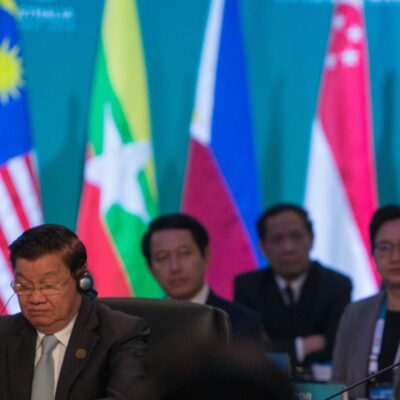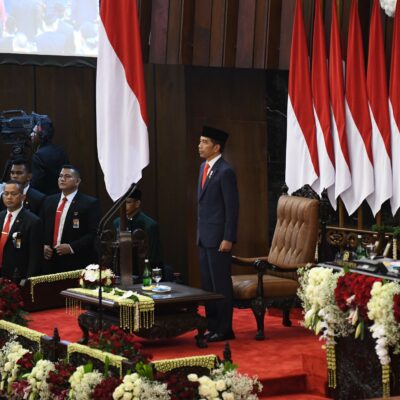In recent years, the Association of Southeast Asian Nations (ASEAN)—a regional inter-governmental organisation that promotes cooperation and integration between Southeast Asian countries—has taken a number of steps towards improving protection of human rights within the region. In 2004, it committed to promoting ‘human rights and obligations’ as part of the Vientiane Action Program, a plan aimed at building an ASEAN community. It subsequently adopted human rights as one of its core principles in its founding document, the ASEAN Charter, in 2007; established an Inter-governmental Commission on Human Rights in 2009; and issued an ASEAN Human Rights Declaration (AHRD) in 2012.
Yet, its flagship regional economic integration initiative, the ASEAN Economic Community, has more or less completely ignored human rights issues. Recent years have seen the emergence of a growing number of forums on Business and Human Rights (BHR) within the region. There has also been a strong push from various civil society organisations (CSOs) and ASEAN’s Intergovernmental Commission on Human Rights for ASEAN to incorporate business and human rights into the AEC framework. But so far, no AEC-related meetings have yielded a formal statement acknowledging the importance of human rights despite its obvious relevance to the initiative.
Perhaps most importantly, human rights principles are not found in the ASEAN Economic Community Blueprint 2025, a strategy document outlining broad directions and strategic measures for the initiative from 2016 to 2025. Prominent human rights activist Haris Azhar argues that the blueprint for the ASEAN Economic Community started from a top-down and elite-driven process. Many parties were not involved in the process until implementation. As a result, the pursuit of regional security and cooperative measures to promote trade and economic development has been the paramount objective, and human rights have remained neglected. For instance the initiative does not have a protection and accountability mechanism that is sufficient for the potential negative impacts of the planned integrated market. ASEAN initiatives to advance human rights protections are seemingly progressing only outside economic sectors.
This is notwithstanding a push from the United Nations to promote the implementation of its Guiding Principles on Business and Human Rights (UNGPs), a framework for ensuring human rights protection that emphasises states’ duties to protect human rights, corporate responsibility to respect human rights, and access to remedies for victims of business-related abuses. It is also despite the fact that a number of other regional organisations, like the African Union and the Organisation of American States, have embraced and discussed issues related to the UNGPs since 2011.
ASEAN’s reluctance to accommodate human rights concerns within the ASEAN Economic Community is concerning because human rights ideas developed in ASEAN can produce a stronger commitment to human rights at the domestic level. For instance, the adoption of the AHRD in 2012 is a major milestone in the institutionalisation of human rights within the region. Brunei Darussalam, Malaysia, Myanmar, and Singapore are not signatories to the International Covenant on Civil and Political Rights, but they have all signed the AHRD. Its provisions are the “strongest commitments these states have made to political rights”. The fact that the ASEAN Economic Community has largely ignored human rights concerns thus represents a missed opportunity for wider human rights promotion and protection in ASEAN member states.
Why hasn’t ASEAN adopted business and human rights within its economic community framework?
Many analysts have viewed the problem of human rights institutionalisation in ASEAN as being rooted in member states’ long-standing reluctance to fully respect and internalise universal human rights standards. The international relations scholar Hiro Katsumata, for instance, has argued that the existing institutionalisation of human rights in ASEAN reflects member states’ pragmatism in responding to Western countries’ demands for it to adopt international human rights standards. Specifically, it reflects the way they have modified such standards into something that can bring benefit to the Association. While providing a useful analysis, this view risks oversimplifying the problem and underplays the practical difficulties relating to how human rights issues are adopted within existing ASEAN mechanisms.
In our view, the institutionalisation of business and human rights within ASEAN’s economic community framework is constrained by the fragmented nature of ASEAN’s governance. This fragmented governance stems from silo-isation within the organisation and, in relation to business and human rights issues specifically, ASEAN member states’ diversity of beliefs surrounding the UNGPs. Different from existing scholars’ focus on the general normative positions of member states, our analytical focus on fragmentation highlights political actors’ entrenchment within ASEAN mechanisms at a practical level.
Silo mentality within ASEAN
It is common for regional governance mechanisms to undergo simplification processes whereby decision-making systems are split into smaller units. This creates organisational efficiencies and serves to direct political attention to hitherto under-served areas. But the result can be fragmented governance when it produces “distinct parts that are hardly ever fully interlinked and integrated” and a deeper organisational pathology characterised by non-cooperation and non-holistic approaches to problems and new ideas. So it has been with ASEAN.
The division of ASEAN coordination is divided into three distinct pillars—namely ‘political and security’, ‘economic’, and ‘socio-cultural’. This arrangement is aimed at enhancing regional integration and ensuring durable peace, stability and shared prosperity in the region. However, the existence of these distinct pillars has created a silo mentality that has hindered cross-pillar adoption of business and human rights. ASEAN officials have regarded human rights as a notion pertaining to ‘political and security’ issues and ‘socio-cultural’ issues rather than ‘economic’ issues.
The Inter-governmental Commission on Human Rights has been endorsing the idea of business and human rights since 2014. The regional human rights body held various activities, such as a workshop on ‘corporate social responsibility (CSR) and human rights’ as the one of the outcomes of an Inter-governmental Commission on Human Rights thematic study in 2014, a training program on business and human rights in 2017, and an inter-regional dialogue on sharing good practices on business and human rights in 2018 and 2019.
However, the aforementioned activities are often viewed as pertinent only to the political and security pillar within ASEAN. This is confirmed by ASEAN officials working on the ASEAN Economic Community pillar. In an interview, an official from the Indonesian Ministry of Trade acknowledged that ‘human rights is often associated with political and security pillar’ and claimed that he ‘had no idea why human rights needs to be included in trade negotiations’. It was only after joining the Inter-governmental Commission on Human Rights’ workshop on business and human rights, that our interviewee realised that other regional organisations have adopted business and human rights and internalised it within their trade agreements with other countries.
While such figures are gradually socialised with the idea of business and human rights, however, there is an overall lack of political commitment to the business and human rights agenda within the ASEAN Economic Community pillar. The idea of business and human rights is still not a pressing issue in the discussion of the ASEAN Economic Community high-level task force for ASEAN economic integration. An official from the Indonesian Ministry of Trade even claimed in an interview that s/he had yet to receive any signal from ASEAN leaders concerning business and human rights and that the current focus of the ASEAN Economic Community officials and the related staff from the ASEAN Secretariat is on finalising the Regional Comprehensive Economic Partnership (RCEP). The specialization of each pillar has apparently created a form of fragmented governance where each unit focuses on its perceived domain issue and demonstrates a great deal of reluctance to a holistic view of other issues.
Disunity among ASEAN Member States on the UNGPs
Disunity among member states on the UNGPs has also hampered prospects for incorporating business and human rights into the ASEAN Economic Community. According to Article 1(7) of the ASEAN Charter, the Association commits to strengthening democracy, enhancing good governance and the rule of law, and promoting and protecting human rights and fundamental freedoms. This article gives a mandate to ASEAN to uphold and internalise human rights principles. Nevertheless, the ASEAN Charter also endorses member states’ individual approaches to human rights. This has led to a situation whereby member states have great latitude to define how they should address human rights issues. The effect has been to produce a variety of national responses with regards to the UNGPs and more generally issues associated with business and human rights.
For instance, each ASEAN member state has had a different stance on the UN’s call for countries to develop a national action plan (NAP) on business and human rights. At one extreme, Brunei, Cambodia, Laos, Singapore and Vietnam have no plan yet to develop NAPs on business and human rights. At the other extreme, Thailand and Malaysia have reportedly made substantial progress towards the development of NAPs. In 2018 and 2019, Thailand engaged with the UN and the Inter-governmental Commission on Human Rights to organise business and human rights forums in Bangkok. At both meetings, Thai representatives stated their strong support for a NAP on business and human rights and encouraged other ASEAN member states to do the same thing. Since February 2019, the Thai government has circulated a draft national action plan for business and human rights. For its part, Malaysia, through SUHAKAM, has developed a strategic framework for promoting awareness on business and human rights targeting the business sector, government, and general public as a crucial first step towards the development of an NAP on business and human rights.
Myanmar, the Philippines and Indonesia lie somewhere in between. For instance, Indonesia does not appear to be developing a NAP on business and human rights but is preparing instead for the merging of a draft NAP prepared by the National Human Rights Commission (KomnasHAM) and the human rights civil society organization ELSAM with the existing NAP on human rights. Some have argued that merging the two national action plans is the best way of getting the government’s endorsement of the UNGPs. President Joko Widodo is often believed to have been a supporter of deregulating the business sector in Indonesia; and adding a new and compulsory regulation to business sectors will be unpopular in his view. In the Philippines, efforts to introduce BHR has involved proposed changes to legislation. There is strong ongoing pressure from the Commission on Human Rights of the Philippines for an amendment of the Corporation Code (Batas Pambansa Bilang 68) to incorporate the UNGPs into business regulations. In addition, the incorporation of the UNGPs into legislation will be strengthened with the formulation of a NAP on BHR. Meanwhile in Myanmar, promotion and socialisation of BHR and UNGP adoption is still undergoing an incremental process. The Ministry of Investment and Foreign Economic Relations of Myanmar has reportedly stated that the government has undertaken measures to introduce elements of the UNGPs such as requiring companies to report “requirements on human rights”, incorporation of new legislation, and investment and trade treaties. CSOs also play a significant role in making the UNGPs disseminated widely for the public. In April 2015, the Myanmar Center for Responsible Business published a Business and Human Rights Country Guide with the assistance of the Danish Institute of Human Rights.
Table 1: The uneven pattern of response of ASEAN nations to NAPs on business and human rights

The different ASEAN member states’ reactions to business and human rights issues are closely related to political dynamics in each member state. In the case of Indonesia, for instance, we can see that steps have been taken to introduce BHR at the domestic level. Relevant ministries under the auspices of the Coordinating Ministry for Economic Affairs are working on BHR promotion programs. For instance, in an interview, a representative from the Ministry of Law and Human Rights suggested that the Ministry is now focusing on promoting BHR practices in three business sectors—plantation, mining, and tourism. Outside the government, the business community is also aware of the business and human rights agenda. A representative from the Indonesian Chamber of Commerce told us anonymously that the Indonesian business community is willing to contribute to the business and human rights cause. The official also reiterated the importance of multi-stakeholder partnership in introducing business and human rights. However, there is apparently a gap between domestic stakeholders and regional apparatuses. The Ministry of Trade as the focal point for the ASEAN Economic Community negotiating team is not connected with the network of the Coordinating Ministry for Economic Affairs, signalling another form of unintegrated coordination of business and human rights issues.
Conclusion
Challenges at the regional level reflect the silo mentality in each ASEAN Community pillar and the lack of uniformity of ASEAN member states’ positions regarding business and human rights. While the development of the ASEAN Community pillars is aimed at improving regional integration in under-served areas, the organisational practices in the ASEAN Economic Community only prioritise the formation of a trade bloc in the region and focus on the technicalities of trade negotiation. They consequently ignore human rights. Likewise, not all member states have great affinity to the idea of business and human rights. Therefore, it will be difficult to successfully bring business and human rights to the regional system before ensuring all member states have internalised such norms.
By understanding the characteristics of ASEAN’s fragmented governance, it is clear that policies at the regional level will not function effectively if they can’t be translated correctly into the local context and stakeholders at the national level are unfamiliar with the norms embedded in them. For this, it is essential to ensure that before an international norm is promoted and proposed at the regional level, it has to be successfully internalised and implemented well at the domestic level by all member states.
One strategy to support the institutionalisation of business and human rights principles at the domestic level is through the initiation of collaboration between ASEAN member states and global partners, which have successfully integrated these principles into their business policies. Although challenges faced by member states may vary, this collaboration can best support the capacity building of member states, including improvements to the national regulatory system and formulating national plans as a guideline for the implementation of business and human rights.
Authors: Dr Randy Wirasta Nandyatama and Dr Muhammad Rum.
Acknowledgements:
This article is based on our research on ‘Norms Dynamics under Fragmented Governance: The Case of Business and Human Rights in ASEAN Economic Community’ with Dr. Gabriel Lele, Dio Tobing, Karina Larasati, and Yuyun Wahyuningrum (the current Indonesian representative to AICHR) in 2019. The research was supported by the Faculty of Social and Political Science, Gadjah Mada University. In preparing this piece, we benefited from interviews with Indonesian government officials, CSOs, and ASEAN scholars during our field trip in Jakarta, Kuala Lumpur, and Melbourne in 2019. We humbly appreciate the feedback and comments given by Prof. Andrew Rosser, Cathy Harper (MAR’s editor), and an anonymous reviewer.
Image: A floating market in Borneo, Indonesia. Credit: Water Alternatives/Flickr.




